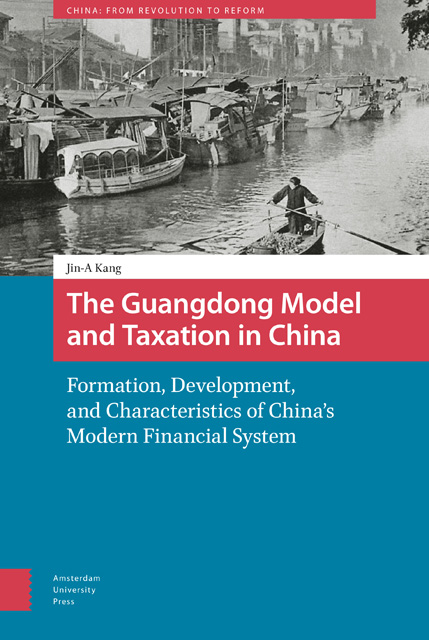 The Guangdong Model and Taxation in China
The Guangdong Model and Taxation in China Book contents
- Frontmatter
- Table of Contents
- Abbreviations
- Acknowledgments
- Introduction: The Modern Transformation of the Imperial Fiscal System: The Case of Provincial Finance in Guangdong
- Part 1 New Tax Revenues in Guangdong during the Republican Era
- Part 2 State-led Industrialization and the State Monopoly
- Part 3 Reform of Tax Collection
- Part 4 The Transition of the Modern Chinese Tax Structure in a Global Context
- Bibliography
- Glossary
- Index
7 - The Building of Public Administration and Taxation
Published online by Cambridge University Press: 10 January 2023
- Frontmatter
- Table of Contents
- Abbreviations
- Acknowledgments
- Introduction: The Modern Transformation of the Imperial Fiscal System: The Case of Provincial Finance in Guangdong
- Part 1 New Tax Revenues in Guangdong during the Republican Era
- Part 2 State-led Industrialization and the State Monopoly
- Part 3 Reform of Tax Collection
- Part 4 The Transition of the Modern Chinese Tax Structure in a Global Context
- Bibliography
- Glossary
- Index
Summary
Abstract
Chapter 7 discusses the process of the Guangdong provincial government's efforts to reform its administration of tax collection. The tax collection in Guangdong province relied heavily on a tax-farming system where contractors varied from traditional merchant guilds to professional tax-farmers. The co-existence of various currencies and their daily fluctuating exchange rates added to the difficulty of tax collection. The provincial governments tried to set up tax bureaus locally and create a unified and top-down tax collection system in Guangdong. However, the complete abolition of the contract system was never declared due to the financial vulnerability of the provincial government. The Chen Jitang regime in Guangdong heavily depended on fund-raising through loans from merchants.
Keywords: tax-farming, Guangdong, China, tax collection
Various evaluations of the tax-farming system
The tax-farming system is a taxation method that allows the government to delegate administrative affairs to private organizations. It is based on a mutual agreement between the government and a private organization. However, tax-farming in Chinese history always had negative implications. Delegating administration to middlemen, particularly in taxation, was linked to exploitation of the people and the malfunctioning of state administration.
Prasenjit Duara's study of rural areas in North China in the 1920s analyzes the penetration of state power to the grassroots level by shifting from a tax system through traditional gentlemen and local communities to the rise of tax “brokerism” during Republican China. According to Duara, the taxfarming system was part of a violent process in which state power infiltrated the private sector to obtain financial resources, and the tax farmers were profit-seeking because they did not belong to local communities. Meanwhile, Susan Mann describes the transition between the two systems as “liturgical.” In the 1930s, the bidding system introduced professional tax contractors, which Mann depicts as the demise of the liturgical tax strategies. In Mann's research, the tax-farming system was introduced by the state's aspirations to expand financial resources, and tax-farming and traditional taxation through guilds were established incompatible binarities.
Mann's study focuses mainly on the emergence and characteristics of the likin tax in the late Qing and it lacks a detailed analysis of the professional tax-farming merchants during Republican China.
- Type
- Chapter
- Information
- The Guangdong Model and Taxation in ChinaFormation, Development, and Characteristics of China's Modern Financial System, pp. 175 - 192Publisher: Amsterdam University PressPrint publication year: 2022
